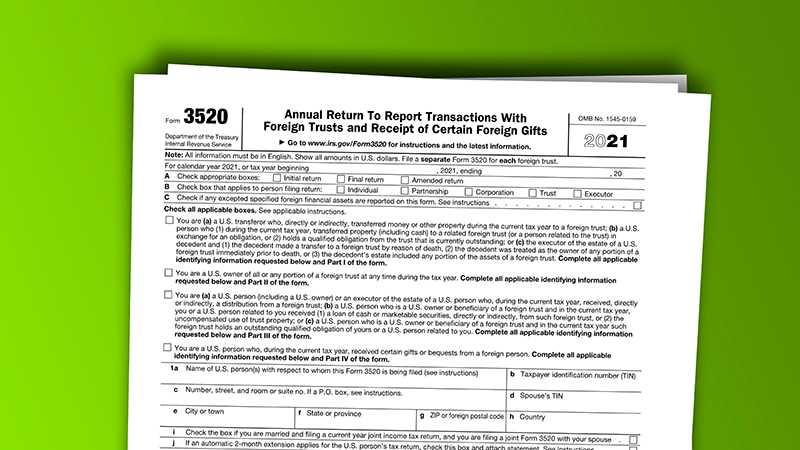Comprehending the Importance of Coverage Foreign Inheritance to IRS for Tax Conformity
Navigating the complexities of international inheritance requires a clear understanding of IRS reporting commitments. Lots of individuals ignore the significance of properly reporting these possessions, which can result in unintended consequences. Failing to abide with IRS regulations might result in legal issues and substantial fines. It is vital to comprehend the nuances bordering international inheritances to stay clear of risks. The following sections will certainly clarify crucial facets of conformity and the possible dangers entailed.

What Constitutes Foreign Inheritance?
When a private obtains possessions from a deceased person's estate situated outside of the United States, this transfer is thought about an international inheritance. Foreign inheritances can consist of numerous sorts of possessions such as realty, checking account, financial investments, individual belongings, and company rate of interests. The worth and nature of these properties might differ noticeably relying on the regulations and customs of the nation in which the estate is located.
In addition, the process of obtaining these properties can involve navigating through foreign legal systems, which might impose specific requirements or tax obligations connected to inheritance. The recipient might also experience difficulties in determining the fair market price of the acquired possessions, particularly if they are not acquainted with the local actual estate or financial markets. Recognizing what comprises a foreign inheritance is important for individuals to assure compliance with both local laws and any kind of possible responsibilities they may have in their home nation.
IRS Coverage Requirements for Foreign Inheritance
Just how does one guide through the IRS coverage demands for foreign inheritance? People who receive an inheritance from abroad has to recognize particular reporting commitments to assure compliance with IRS regulations. The Foreign Financial Institution and Financial Accounts Report (FBAR) is one vital requirement; if the complete value of international accounts surpasses $10,000 any time during the year, it should be reported. In addition, Type 3520 may be required for reporting foreign gifts or inheritances over $100,000 from non-U.S. individuals. This type records information about the inheritance, consisting of the source and quantity. Failing to stick to these reporting needs can result in considerable penalties. It is essential for recipients to maintain complete records of the inheritance, including any kind of documentation from international entities. Consulting with a tax obligation specialist educated regarding worldwide tax obligation laws can offer additional support in steering via these reporting responsibilities properly.
Tax Implications of Obtaining an Inheritance From Abroad
Receiving an inheritance from abroad can bring substantial tax ramifications for individuals, especially as they navigate the intricacies of international tax regulations. The IRS needs united state residents and locals to report international inheritances, which may trigger different tax obligation commitments - foreign gift tax reporting requirements. Inheritances themselves are typically not thought about taxable earnings, reporting is important to prevent charges.
Furthermore, the estate may go through inheritance tax in the foreign country, which could impact the web value received by the heir. If the inheritance includes international assets, such as realty or financial investments, they might feature one-of-a-kind tax factors to consider, including prospective capital gains taxes upon sale.
Individuals might need to comply with foreign try this website tax obligation guidelines, which can vary significantly from U.S. regulations. Recognizing these ramifications is vital for correct tax obligation conformity and to ensure that all obligations are satisfied without incurring legal issues or unneeded expenses.
Common Mistakes to Stay Clear Of When Reporting Inheritance

Actions to Ensure Conformity With IRS Laws
Understanding the steps essential to assure compliance with IRS guidelines is essential for anyone reporting an international inheritance. First, people should confirm whether the inheritance exceeds the reporting limit, which can cause additional demands. Next off, it is very important to gather all appropriate documents, consisting of the will, trust fund documents, and documents of the foreign estate's value.
Submitting Kind 3520, which especially addresses foreign gifts and inheritances, is vital to notify the IRS of the inheritance. Individuals should also make particular that any kind of suitable taxes associated with the inheritance are paid, consisting of possible inheritance tax in the foreign jurisdiction.
In addition, maintaining precise records of all purchases and interactions regarding the inheritance can give needed support in instance of an internal revenue service query. Seeking specialist recommendations from a tax expert aware of international tax obligation legislations can further boost conformity and reduce risks related to reporting foreign inheritances.
Frequently Asked Concerns

What Takes place if I Fail to Record My International Inheritance?
Falling short to report a click to read foreign inheritance can result in significant this link fines, passion on unsettled taxes, and prospective lawful effects. The IRS may pursue enforcement activities, making complex future monetary dealings and conformity responsibilities for the private included.
Can I Deduct Expenses Connected to Finding Foreign Inheritance?
No, expenses related to obtaining a foreign inheritance are normally not deductible for tax objectives. Inheritance itself is usually not taken into consideration taxable revenue, and connected prices can not be declared to reduce tax obligation obligation.
Are There Charges for Late Reporting of Foreign Inheritance?
Yes, there are charges for late coverage of foreign inheritance to the IRS - penalties for not filing Form 3520. These can include penalties and interest on unsettled taxes, making prompt disclosure vital for conformity and preventing added financial problems
How Does Foreign Inheritance Impact My State Tax Obligations?
Foreign inheritance may affect state tax obligations in a different way relying on jurisdiction. Some states impose inheritance or inheritance tax, while others do not. It is important to seek advice from neighborhood policies to establish specific tax obligation ramifications associated with foreign inheritance.

Are Presents From Abroad Taken Into Consideration Foreign Inheritance for IRS Purposes?
Gifts from abroad are not classified as foreign inheritance for IRS objectives. penalties for not filing Form 3520. Instead, they are dealt with separately under present tax policies, with various coverage requirements and thresholds that people should abide by for compliance
In addition, the procedure of obtaining these assets can entail navigating via international lawful systems, which may enforce specific demands or tax obligations related to inheritance. The Internal revenue service calls for United state citizens and residents to report foreign inheritances, which might set off numerous tax obligation commitments. Sending Form 3520, which particularly deals with international presents and inheritances, is vital to educate the Internal revenue service of the inheritance. Falling short to report a foreign inheritance can lead to significant fines, passion on overdue taxes, and prospective lawful consequences. No, expenditures connected to obtaining an international inheritance are typically not deductible for tax obligation purposes.